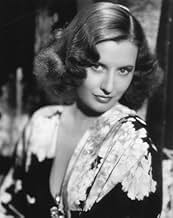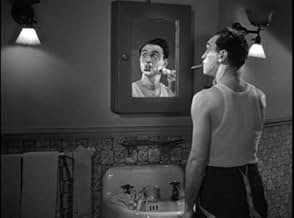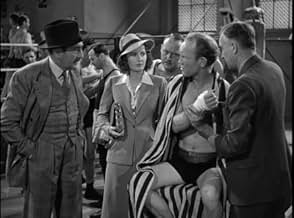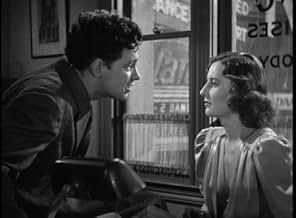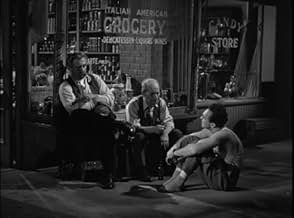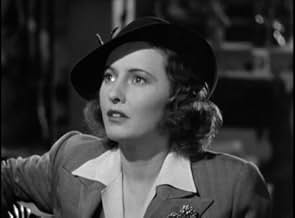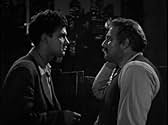IMDb-BEWERTUNG
6,8/10
2296
IHRE BEWERTUNG
Füge eine Handlung in deiner Sprache hinzuA poor young Italian man, who is a virtuoso on the violin, wishes to become a champion boxer to make a fortune for his family. But what is the road to success and happiness, and what is the ... Alles lesenA poor young Italian man, who is a virtuoso on the violin, wishes to become a champion boxer to make a fortune for his family. But what is the road to success and happiness, and what is the price?A poor young Italian man, who is a virtuoso on the violin, wishes to become a champion boxer to make a fortune for his family. But what is the road to success and happiness, and what is the price?
- Für 1 Oscar nominiert
- 1 Gewinn & 1 Nominierung insgesamt
Edward Brophy
- Roxy Lewis
- (as Edward S. Brophy)
Charles Halton
- Newspaperman
- (Gelöschte Szenen)
Stanley Andrews
- Driscoll - Fight Official
- (Nicht genannt)
Gordon Armitage
- Fighter
- (Nicht genannt)
Earl Askam
- Policeman
- (Nicht genannt)
Don Brodie
- Reporter
- (Nicht genannt)
Mushy Callahan
- Fight fan
- (Nicht genannt)
Dora Clement
- Ill Ringsider Who Won't Leave
- (Nicht genannt)
Empfohlene Bewertungen
"They are good for only one thing now - slugging!", Joe Bonaparte says with self-disgust, looking down at his broken hands after a middleweight prize fight at Madison Sqare Garden.
Joe had the option to be a great classical violinist, but the girl he was in love with wet his appetite for the quick buck and the American dream. "It's a big city, little people don't stand a chance", says Lorna, egging him up, playing up to his male ego. "Money's the answer". And the poor Italian immigrant kid grabs the bait, hangs up the violin and sells out.
'Golden Boy' is a piece of vintage Americana that is a bit hard to take today. Clifford Odets' controversial play was openly socialist and crammed with sudden, badly integrated political insights about "competetive civilization" and "a man hits his wife, and it's the first step towards fascism". It is all about the flip side of the American dream and gets a bit heavy-handed at times.
Lee J. Cobb is almost unbearably schmaltzy as the all-embracing, tearful Italian Papa, whereas Adolphe Menjou balances his performance carefully as the basically benign boxing promoter whose mistress is Lorna, Joe's chosen one, "just a dame from Newark" as she presents herself.
Barbara Stanwyck is more or less going through the motions as the hard-as-nails Lorna, and the real star of the picture is 21 year old newcomer William Holden, impossibly handsome and hunky, starting out with perfectly tousled curly hair. His performance is as yet immature and unfinished, but he has his moments and makes up for a shaky ride with loads of charisma, and he more than holds his own in the climactic title fight at the Garden, playing against the Chocolate Drop, "the pride of Harlem" in this race-segregated boxing haven.
'Golden Boy' is not, though, one of director Mamoulian's happier efforts. It is far too maudlin to look like anything Mamoulian ever did, it is not like him to lay it on this thick. It has none of the quirks or edge from 'Dr. Jekyll and Mr. Hyde' among others, but it is lushly, richly orchestrated in the vein of 19th century European music.
Joe had the option to be a great classical violinist, but the girl he was in love with wet his appetite for the quick buck and the American dream. "It's a big city, little people don't stand a chance", says Lorna, egging him up, playing up to his male ego. "Money's the answer". And the poor Italian immigrant kid grabs the bait, hangs up the violin and sells out.
'Golden Boy' is a piece of vintage Americana that is a bit hard to take today. Clifford Odets' controversial play was openly socialist and crammed with sudden, badly integrated political insights about "competetive civilization" and "a man hits his wife, and it's the first step towards fascism". It is all about the flip side of the American dream and gets a bit heavy-handed at times.
Lee J. Cobb is almost unbearably schmaltzy as the all-embracing, tearful Italian Papa, whereas Adolphe Menjou balances his performance carefully as the basically benign boxing promoter whose mistress is Lorna, Joe's chosen one, "just a dame from Newark" as she presents herself.
Barbara Stanwyck is more or less going through the motions as the hard-as-nails Lorna, and the real star of the picture is 21 year old newcomer William Holden, impossibly handsome and hunky, starting out with perfectly tousled curly hair. His performance is as yet immature and unfinished, but he has his moments and makes up for a shaky ride with loads of charisma, and he more than holds his own in the climactic title fight at the Garden, playing against the Chocolate Drop, "the pride of Harlem" in this race-segregated boxing haven.
'Golden Boy' is not, though, one of director Mamoulian's happier efforts. It is far too maudlin to look like anything Mamoulian ever did, it is not like him to lay it on this thick. It has none of the quirks or edge from 'Dr. Jekyll and Mr. Hyde' among others, but it is lushly, richly orchestrated in the vein of 19th century European music.
A great film. A (very) young William Holden "hits" the bulls-eye on this one. And, I always love to see Barbara Stanwyck's hard, street smart "heart of stone" turn to mush. In a story that won't present you with many surprises as it unfolds, this film is held together by many fine performances. It's from that magical time, long ago, when New York City was inhabited by hustlers and gangsters and boxing was king. It was also inhabited by those of strong family values, the ones fighting that constant battle of the "easy" way or the right way. The mainstay, in that era (in film, anyway), was the ultimate triumph of good. Here, it is a joy to behold. The right choices, by both Stanwyck and Holden, seem very apparent to the viewer, but the right choices are rarely the first ones taken.
Eventually, they can be taken......
Eventually, they can be taken......
This is a wonderful, compelling, emotionally charged movie, with characters that are both interesting and likable. Of course, the central character of the movie is Joe Bonaparte, played by a young, gifted actor named William Holden. Joe's conflict, between his quest for fame as a prize fighter and his father's wish to become a concert violinist, although seemingly corny and contrived, actually works in this movie. And this can be attributed to the fine acting of all the players - Barbara Stanwyck, Lee J. Cobb, Adolph Menjou, and William Holden - who prove that high quality acting can transform a good script into a great script. One particularly intense scene is when Joe tries to play the violin - and he can't, leaving him devastated in the knowledge that he had squandered a gift and in the process had disappointed his father. This is a movie that is worth the time to watch and to enjoy.
William Holden became a star as a result of this film, but there is no question that Barbara Stanwyck is the real star of this picture. She gives a performance that is beautifully layered and Her performance is nothing short of marvelous (My favorite line is when she says, "I'm my mother's girl"). And those beautiful shoulders!
Everyone knows the story of the boy who is torn between a life of boxing and music. The screenplay is a product of the times that it was written in. How else can you explain dialogue that glorifies men beating their wives? Or the leftist remarks that are spoken by the Bonaparte's friend, Mr. Carp? A black boxer named "Chocolate"?! Never happen today.
Everyone is great. Lee J. Cobb as an Italian is heartbreaking, even if his accent is laid on a little thick (It's like watching Laurence Olivier in "The Jazz Singer"). Sam Levene is good as the brother-in-law. And Joseph Calleia as Fuseli, is wonderful. When Stanwyck enters Holden's dressing room after the fight, he says, "Out Miss Moon, this ain't no cocktail lounge." Wonderful. I would love to see Pacino ham his way through this role.
But it is Miss Stanwyck who stands out. We can be thankful that she gave Holden his opportunity and fought to keep him. We can be even more grateful for this wonderful performance.
Everyone knows the story of the boy who is torn between a life of boxing and music. The screenplay is a product of the times that it was written in. How else can you explain dialogue that glorifies men beating their wives? Or the leftist remarks that are spoken by the Bonaparte's friend, Mr. Carp? A black boxer named "Chocolate"?! Never happen today.
Everyone is great. Lee J. Cobb as an Italian is heartbreaking, even if his accent is laid on a little thick (It's like watching Laurence Olivier in "The Jazz Singer"). Sam Levene is good as the brother-in-law. And Joseph Calleia as Fuseli, is wonderful. When Stanwyck enters Holden's dressing room after the fight, he says, "Out Miss Moon, this ain't no cocktail lounge." Wonderful. I would love to see Pacino ham his way through this role.
But it is Miss Stanwyck who stands out. We can be thankful that she gave Holden his opportunity and fought to keep him. We can be even more grateful for this wonderful performance.
The acclaimed play by Clifford Odets, Golden Boy, ran for 250 performances during the 1937-1938 season on Broadway and as Columbia had now pulled itself into the big leagues of studios in Hollywood, Harry Cohn was able to bid for this much heralded property right up there with Mayer, Zanuck, and Zukor.
The problem was that the one guy who could have played it best, John Garfield, was over at another studio. Garfield was in the original cast on Broadway, but in the role of the brother-in-law Siggie that Sam Levene plays here. Eventually however Garfield did play the title role in a revival on Broadway in 1952, it was the last thing he did.
When I lived in New York, I saw a revival of Clifford Odets's Awake and Sing on stage and the left wing nostrums of the day were dated in the Reagan years of the Eighties. Golden Boy is similarly dated. Yet the performances in the film still hold up to some degree.
When Harry Cohn couldn't get Tyrone Power loaned out from 20th Century Fox, he decided to go for an unknown. Director Rouben Mamoulian while testing actresses for the sister part that eventually went to Bernice Blinn, he spotted a young actor who had just done two tiny bit parts in Paramount features feeding lines to the actress whose test it was. Mamoulian persuaded Cohn to call off the search and William Holden's career was launched.
It's legendary now how Barbara Stanwyck worked and rehearsed with Holden endlessly to make sure he scored a success in his feature film debut. Holden paid a heartfelt tribute to her at an Oscar ceremony and when she got her Lifetime Achievement Oscar she dedicated it to him.
It's legendarily unselfish of Stanwyck to do what she did in a town and industry where egos are gargantuan. Unselfish, but also practical. She knew that if he flopped in the lead the film would have gone down the toilet and it wouldn't do her career any good.
The only player from the original cast on Broadway to come to Hollywood was Lee J. Cobb. And not in the part he played on Broadway, on Broadway he was the neighbor Mr. Carp, in the film he's made up to be older as Cobb often was as Bill Holden's father. This set a pattern in his career.
Two other performances of note are Adolphe Menjou as Holden's manager and Joseph Calleia as the gangster Fusselli who buys into Holden's contract.
This story of a Depression kid who had a choice between a career in the ring and a career playing the violin had to be heavily rewritten for the screen. The adulterous relationship between the married Menjou whose wife we never see and Stanwyck was barely mentioned. And Stanwyck's own character was cleaned up quite a bit, in the original play she's more of a tramp than here.
My guess is that Golden Boy would have to be heavily rewritten if it were updated for today. The critical success, but financial failure of Ron Howard's Cinderella Man which was a true story of a heavyweight champion in the Depression found no audience today.
Though it's dated badly, the sincerity of the performances do come through and it's easy to see why William Holden became the star he was.
The problem was that the one guy who could have played it best, John Garfield, was over at another studio. Garfield was in the original cast on Broadway, but in the role of the brother-in-law Siggie that Sam Levene plays here. Eventually however Garfield did play the title role in a revival on Broadway in 1952, it was the last thing he did.
When I lived in New York, I saw a revival of Clifford Odets's Awake and Sing on stage and the left wing nostrums of the day were dated in the Reagan years of the Eighties. Golden Boy is similarly dated. Yet the performances in the film still hold up to some degree.
When Harry Cohn couldn't get Tyrone Power loaned out from 20th Century Fox, he decided to go for an unknown. Director Rouben Mamoulian while testing actresses for the sister part that eventually went to Bernice Blinn, he spotted a young actor who had just done two tiny bit parts in Paramount features feeding lines to the actress whose test it was. Mamoulian persuaded Cohn to call off the search and William Holden's career was launched.
It's legendary now how Barbara Stanwyck worked and rehearsed with Holden endlessly to make sure he scored a success in his feature film debut. Holden paid a heartfelt tribute to her at an Oscar ceremony and when she got her Lifetime Achievement Oscar she dedicated it to him.
It's legendarily unselfish of Stanwyck to do what she did in a town and industry where egos are gargantuan. Unselfish, but also practical. She knew that if he flopped in the lead the film would have gone down the toilet and it wouldn't do her career any good.
The only player from the original cast on Broadway to come to Hollywood was Lee J. Cobb. And not in the part he played on Broadway, on Broadway he was the neighbor Mr. Carp, in the film he's made up to be older as Cobb often was as Bill Holden's father. This set a pattern in his career.
Two other performances of note are Adolphe Menjou as Holden's manager and Joseph Calleia as the gangster Fusselli who buys into Holden's contract.
This story of a Depression kid who had a choice between a career in the ring and a career playing the violin had to be heavily rewritten for the screen. The adulterous relationship between the married Menjou whose wife we never see and Stanwyck was barely mentioned. And Stanwyck's own character was cleaned up quite a bit, in the original play she's more of a tramp than here.
My guess is that Golden Boy would have to be heavily rewritten if it were updated for today. The critical success, but financial failure of Ron Howard's Cinderella Man which was a true story of a heavyweight champion in the Depression found no audience today.
Though it's dated badly, the sincerity of the performances do come through and it's easy to see why William Holden became the star he was.
Wusstest du schon
- WissenswertesWilliam Holden was so grateful to Barbara Stanwyck for her insistence on casting him in Golden Boy (1939), his first big role, that he reportedly sent her flowers every year on the anniversary of the first day of filming.
- PatzerJoe's chest is completely smooth during the big fight. Immediately after the fight, when he is dressed, he has chest hair visible at the top of his shirt.
- Zitate
Eddie Fuseli: This your girl?
Lorna Moon: I'm my mother's girl.
- Alternative VersionenA video version in Argentina was lifted from a 16mm print from Columbia Pictures, in English with Spanish language subtitles. The credits of this version are translated in Spanish.
- VerbindungenEdited into Head (1968)
- SoundtracksWe're in the Money Now
Sung a cappella by Adolphe Menjou to the tune of the traditional
nursery rhyme "The Farmer in the Dell"
Top-Auswahl
Melde dich zum Bewerten an und greife auf die Watchlist für personalisierte Empfehlungen zu.
- How long is Golden Boy?Powered by Alexa
Details
- Erscheinungsdatum
- Herkunftsland
- Sprache
- Auch bekannt als
- Zlatan decko
- Drehorte
- Eighth Avenue and 50th Street, Manhattan, New York City, New York, USA(Madison Square Garden, located at the West side of 8th Avenue from 1925 to 1968)
- Produktionsfirma
- Weitere beteiligte Unternehmen bei IMDbPro anzeigen
- Laufzeit1 Stunde 39 Minuten
- Farbe
- Seitenverhältnis
- 1.37 : 1
Zu dieser Seite beitragen
Bearbeitung vorschlagen oder fehlenden Inhalt hinzufügen


